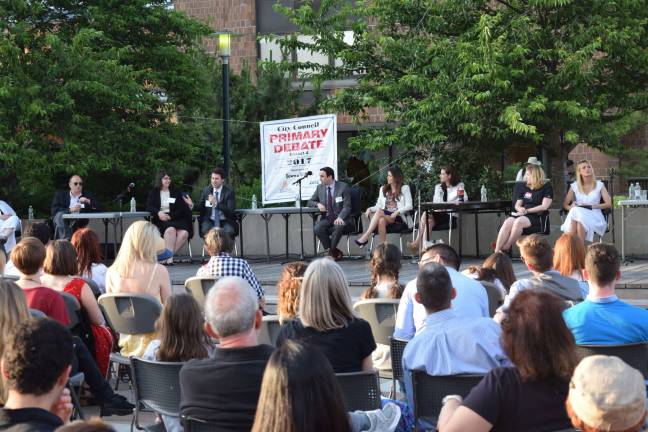Council District 4 Candidates Spar at Debate


Candidates running for the District 4 city council seat laid out their platforms to constituents at a public debate held June 22 at Waterside Plaza.
The debate, sponsored by Town & Village newspaper, the Waterside Tenants Association and Waterside Plaza management, featured 11 candidates vying for the seat currently held by Council Member Dan Garodnick, who is prevented by term limits from seeking reelection. Dozens of East Siders filled the sun-drenched plaza on a warm Thursday evening to hear the contenders' competing visions for the district, which includes Stuyvesant Town-Peter Cooper Village, East Midtown, and much of the Upper East Side.
Nine of the participants hope to win the Democratic Party's nomination: Vanessa Aronson, Maria Castro, Alec Hartman, Rachel Honig, Melissa Jane Kronfeld, Jeffrey Mailman, Keith Powers, Bessie Schachter, Barry Shapiro and Marti Speranza. They took the stage alongside Republicans Rebecca Harary and Melissa Jane Kronfeld. Both parties will choose their nominees September 12, eight weeks before the November 7 general election.
Each candidate delivered a brief opening statement and then responded to questions posed by the moderators, Town & Village editor Sabina Mollot and Waterside Tenants Association president Janet Handal. The evening was characterized by broad agreement on at least one topic: across both party affiliation and professional background, candidates repeatedly emphasized that affordability is among the most important issues facing the district. Much of the conversation centered on various proposals to ensure the availability of affordable housing and ease the economic burdens facing the community's small businesses and seniors.
Several candidates touted their previous positions in government to voters, while others took the opposite approach, stating that their experience in other fields would allow them to bring fresh ideas to the table.
Keith Powers and Bessie Schachter each previously worked as staffers for state Senator Liz Krueger and referenced their familiarity with government and the legislative process. Powers, who also served as chief of staff to Assembly Member Jonathan Bing and as a lobbyist with the firm of former City Council Speaker Peter Vallone, Sr., said of his resume, “I think it's the right type of experience that you need to bring to the job when we talk about issues like affordable housing, small businesses, [and] improving public transportation.”
Jeffrey Mailman, an attorney and Turtle Bay resident who serves as legislative director and counsel to Queens Council Member Elizabeth Crowley, cited his six years of experience in the council chambers as a selling point. “I know most of the council members and their staff members and I know how to get things done,” Mailman said.
Maria Castro proudly stated that she had never been an employee of the government or an elected official, and said that the knowledge she developed working as a political consultant in the real estate and construction industry would help her to effectively negotiate with developers to create affordable housing.
Alec Hartman, the co-founder of a cloud-computing business, said his experience in the technology and startup realms would bring a needed new perspective to city government. “We don't have anyone on the council who has tech or innovation experience at all,” he said. One tech-based proposal that Hartman said he'd champion as a council member is a new unified system for affordable housing applications.
On the topic of housing, a number of candidates advocated for an updated version of the Mitchell-Lama program, the affordable housing initiative that helped fund the construction of Waterside Plaza.
Barry Shapiro, a 40-year resident of Stuyvesant Town-Peter Cooper Village, said that quality of life in the development had declined in recent years — evidence, he said, that affordable housing programs are not working for tenants as they were originally intended, and that leaders in city council should pressure Democrats in Albany to reform housing programs controlled at the state level. “I'm more for taking away some of the benefits that developers are getting rather than extending more to them,” he said.
Vanessa Aronson, a former New York City public school teacher and foreign service officer with the U.S. Department of State, echoed Shapiro's call for city Democrats to use their platform to push for better outcomes in the state capitol. “Our local Democratic leaders need to put pressure on the turncoat Democrats who are siding with the Republicans to keep the decisions made for housing in Albany rather than right here, where they should be made,” she said, referencing members of the Independent Democratic Conference, who have formed a coalition with Republicans in the state senate.
Marti Speranza said that the city can't rely on existing programs to meet its affordable housing needs and said she would push for new solutions, such as creating a community land bank of vacant spaces owned by the city that could be used as sites for permanent affordable housing built by non-profit developers. Speranza, the director of the city initiative Women Entrepreneurs NYC and former director of strategic initiatives with the city's Department of Consumer Affairs, led the race in fundraising by a wide margin as of the most recent campaign finance disclosure deadline. As of May 15, Speranza had raised over $176,000; her next closest competitor, Powers, had raised roughly $98,000. Public matching funds for contributions from small donors have not yet been awarded.
Schachter said that the city needs to review projects with affordable housing components to ensure that developers' promises are met. “We're actually spending $1.4 billion every year as a city in subsidies that go to landlords, and in exchange they're supposed to build affordable units in a lot of these new buildings that you can see going up,” she said. “And yet we're never auditing any of those programs.” An audit, Schachter said, would allow the city to recoup any funds not actually spent by developers on affordable housing.
Rachel Honig, a public relations professional and former special projects director with the New York State Council on the Arts, said affordable housing regulations currently in place need to be better enforced. “The first thing we have to do is hold the mayor and city hall accountable to the protections that are in place,” she said, adding that new solutions need to be used to create additional affordable housing stock as well.
Powers agreed that new affordable housing stock should be created and emphasized the need to provide units available specifically to seniors, adding that with respect to any new senior housing in the district, preference should be given to seniors who already live in the area. Hartman proposed ending the city's “homeless hotel” program and redirecting the funding to improved senior and housing programs.
Rebecca Harary, an entrepreneur and founder of several non-profits who ran unsuccessfully for the state assembly seat held by Dan Quart in 2016, proposed a plan to incentivize doctors and nurses to move into buildings with senior populations and then provide on-call medical care to residents in exchange for “a little bit of a discount” in rent. “I'm not happy with what the city council and our mayor is going to be spending next year for our city council budget — it's a record $85 billion — but I will say there is new money in there for senior services and that's a good thing,” she said.
Harary's Republican competitor Melissa Jane Kronfeld pitched a “post-partisan agenda” including property tax and commercial rent tax reform and a shared storefront initiative for small businesses, among other proposals. “The problems that we're confronting and the solutions that we have to implement are far bigger than the party politics that are ripping our country apart,” she said.
Small businesses were a central topic of discussion, as candidates shared their ideas for reducing commercial vacancies and lowering the cost of doing business for local entrepreneurs.
“We truly have a small business crisis,” Honig said, citing the struggles of retailers along the Second Avenue subway corridor during the new transit line's construction as an example of city government failing to help local business owners. Honig said she would prioritize steps to ensure that District 4 businesses are better served during the construction of subsequent segments the Second Avenue subway.
Speranza advocated for a repeal of the commercial rent tax and proposed a system that would provide grants to small businesses. “People come to this city because of its character, not to have a soulless neighborhood of Duane Reades and Chase Banks,” she said.
Mailman outlined a plan to form a task force on small businesses to evaluate the underlying issues causing retail vacancies, gather input from community stakeholders and develop solutions within the council's authority. Powers proposed a tax disincentive for warehousing vacant storefronts and said he supports Borough President Gale Brewer's proposal that would provide tax relief to grocery stores.
Aronson said, “We need to take away every incentive that landlords have to keep these spaces vacant and ensure that we incentivize landlords to give leases to small businesses.”
Castro said that an audit of vacant storefronts should be conducted, and proposed taxing landlords “who are speculating and warehousing storefronts waiting for the next Starbucks or the next big box store to come into their neighborhood.”
This story has been updated to reflect that Keith Powers is no longer a lobbyist with the firm of former City Council Speaker Peter Vallone Sr. Powers and is not currently a registered lobbyist.